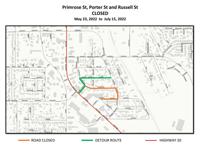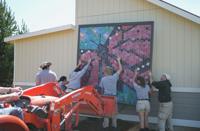LANE COUNTY, Ore. -- New reports on suicide in Lane County show a disturbing climb in the last 20 years.
Between 2000 and 2020, the rate of suicide increased by 80%, totaling 1,458 deaths. In 2020, the county's suicide rate was 65% greater than the U.S. average. The report also indicated that overall, men died about four times as often as women. Men over the age of 65 had the greatest risk of suicide of any age group.
The rates of suicide in Junction City, Florence, and Cottage Grove were about twice the county average.
Roger Brubaker, the suicide prevention coordinator with Lane County Public Health, said suicide is a very serious health problem throughout the county.
"It's alarming to look at these numbers," Brubaker said.
Brubaker said the issue behind the numbers is complex with no one reason.
"Generally speaking, folks who live in the Pacific Northwest have higher rates of suicide, so we are included," Brubaker said.
But what's going on specifically in Lane County? He said age could play a part.
"Our population tends to skewed a little bit older than the rest of the country as a whole, and older adult populations, particularly men, die by suicide far more frequently than younger populations," Brubaker said.
Brubaker also said the county is largely rural, which could be another factor.
"Rural populations tend to die by suicide more frequently than urban and metropolitan populations, and Lane County as a whole is much more rural than a lot of other areas in the county," Brubaker said.
There is also a low number of psychiatric providers throughout the county.
"The health care system step up to support people, oftentimes who are thinking about suicide, is understaffed and overwhelmed quite frequently, and people in crisis don't always have the resources they need," Brubaker said.
So, in hopes of preventing more suicides, he said they'll be ramping up community engagement and making resources more accessible to everyone.
"We are partnering with a number of different organizations in the community to train people in what's called QPR, which stands for question, persuade, and refer. It's really to provide anybody with the basic skills they need to identify people that are having a crisis, ask helpful questions, and get them resources that support them," Brubaker said.
Brubaker said it's now more important than ever to talk about suicide and be there for one another.
"Having a conversation about suicide is an important and lifesaving opportunity," Brubaker said.

Eugene resident Dave Bartlett is a suicide survivor who wants to spread hope to anyone fighting suicidal thoughts.
"You're loved and worth it, and you don't have to go through this alone," Bartlett said.
Ever since high school, Bartlett suffered from depression.
"It's a hopelessness that is so heavy, you don't want to live," Bartlett said.
But he turned that hopelessness into hope by speaking up and inviting others in.
"You can't beat it on your own; you have to reach out. I also have a strong faith in God and know that He helped me," Bartlett said.
He hopes his story will inspire others in the community to do the same.
"Start with someone you trust, but keep going, because it takes some work. But please reach out," Bartlett said.
If you would like to get involved or need help, go to preventionlane.org.














